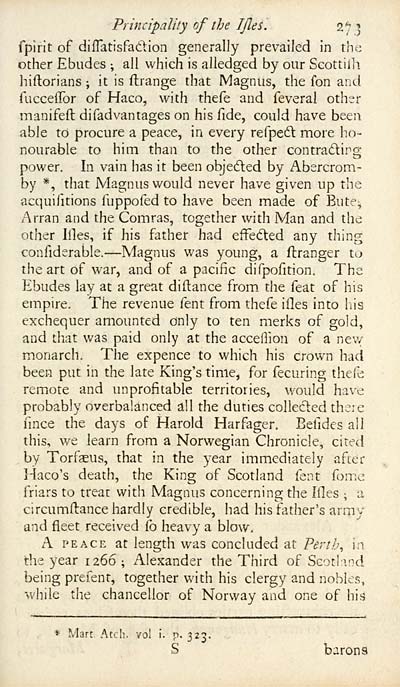Blair Collection > Critical dissertations on the origin, antiquities, language, government, manners, and religion, of the antient Caledonians, their posterity the Picts, and the British and Irish Scots
(311)
Download files
Complete book:
Individual page:
Thumbnail gallery: Grid view | List view

Principality of the IJJes. 2^ ]
fpirit of diffatisfadion generally prevailed in the
other Ebudes ; all which is alledged by our Scottiili
hiftorians ; it is ftrange that Magnus, the fon and
fucceiror of Haco, with thefe and feveral other
manifeft difadvantages on his fide, could have been
able to procure a peace, in every refpeft more ho-
nourable to him than to the other contradlirg
power. In vain has it been objedted by Abercrom-
by *, that Magnus would never have given up the
acquifitions fuppofed to have been made of Bute^
x^rran and the Comras, together with Man and the
other Illes, if his father had effeded any thing
confiderable. — Magnus was young, a flranger to
the art of war, and of a pacific difpofition. The
Ebudes lay at a great di fiance from, the feat of his
empire. The revenue fent from thefe ifles into liis
exchequer amounted dnly to ten merks of gold,
and that was paid only at the acceflion of a nev/
monarch. The expence to which his crown had
been put in the late King's time, for fecuring thefe
remiote and unprofitable territories, would have
probably overbalanced all the duties collecfled there
fince the days of Harold Harfager. Befides all
this, we learn from a Norwegian Chronicle, cited
by Torfaeus, that in the year immediately after
x-iaco's death, the King of Scotland fent fome
friars to treat with Magnus concerning the Ifles -, a
circumftance hardly credible, had his father's army
and fleet received (o heavy a blow.
A PEACE at length was concluded at Pertly ia
the year 1266; Alexander the Third of Scotlvid
being prefent, together with his clergy and nobles,
while the chancellor of Norway and one of his
* Mart Atch. vol i. p. 323.
S barons
fpirit of diffatisfadion generally prevailed in the
other Ebudes ; all which is alledged by our Scottiili
hiftorians ; it is ftrange that Magnus, the fon and
fucceiror of Haco, with thefe and feveral other
manifeft difadvantages on his fide, could have been
able to procure a peace, in every refpeft more ho-
nourable to him than to the other contradlirg
power. In vain has it been objedted by Abercrom-
by *, that Magnus would never have given up the
acquifitions fuppofed to have been made of Bute^
x^rran and the Comras, together with Man and the
other Illes, if his father had effeded any thing
confiderable. — Magnus was young, a flranger to
the art of war, and of a pacific difpofition. The
Ebudes lay at a great di fiance from, the feat of his
empire. The revenue fent from thefe ifles into liis
exchequer amounted dnly to ten merks of gold,
and that was paid only at the acceflion of a nev/
monarch. The expence to which his crown had
been put in the late King's time, for fecuring thefe
remiote and unprofitable territories, would have
probably overbalanced all the duties collecfled there
fince the days of Harold Harfager. Befides all
this, we learn from a Norwegian Chronicle, cited
by Torfaeus, that in the year immediately after
x-iaco's death, the King of Scotland fent fome
friars to treat with Magnus concerning the Ifles -, a
circumftance hardly credible, had his father's army
and fleet received (o heavy a blow.
A PEACE at length was concluded at Pertly ia
the year 1266; Alexander the Third of Scotlvid
being prefent, together with his clergy and nobles,
while the chancellor of Norway and one of his
* Mart Atch. vol i. p. 323.
S barons
Set display mode to: Large image | Transcription
Images and transcriptions on this page, including medium image downloads, may be used under the Creative Commons Attribution 4.0 International Licence unless otherwise stated. ![]()
| Permanent URL | https://digital.nls.uk/76290032 |
|---|
| Description | A selection of books from a collection of more than 500 titles, mostly on religious and literary topics. Also includes some material dealing with other Celtic languages and societies. Collection created towards the end of the 19th century by Lady Evelyn Stewart Murray. |
|---|
| Description | Selected items from five 'Special and Named Printed Collections'. Includes books in Gaelic and other Celtic languages, works about the Gaels, their languages, literature, culture and history. |
|---|

